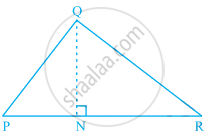Advertisements
Advertisements
प्रश्न
Find the value(s) of k so that the quadratic equation x2 − 4kx + k = 0 has equal roots.
उत्तर
Given equation is x2 − 4kx + k = 0
For the given equation to have equal roots, D = 0.
`rArr b^2-4ac=0 `
`rArr (-4k)^2-4(1)(k)=0`
`rArr 16k^2-4k=0`
`rArr 4k(4k-1)=0`
`rArr4k=0`or `k=1/4`
Hence, for k = 0 or `1/4`, the given equation will have equal roots.
APPEARS IN
संबंधित प्रश्न
Prove that the area of a triangle with vertices (t, t −2), (t + 2, t + 2) and (t + 3, t) is independent of t.
Prove that the points (2, – 2), (–3, 8) and (–1, 4) are collinear
Let A (4, 2), B (6, 5) and C (1, 4) be the vertices of ΔABC.
(i) The median from A meets BC at D. Find the coordinates of point D.
(ii) Find the coordinates of the point P on AD such that AP: PD = 2:1
(iii) Find the coordinates of point Q and R on medians BE and CF respectively such that BQ: QE = 2:1 and CR: RF = 2:1.
(iv) What do you observe?
(v) If A(x1, y1), B(x2, y2), and C(x3, y3) are the vertices of ΔABC, find the coordinates of the centroid of the triangle.
Show that the points O(0,0), A`( 3,sqrt(3)) and B (3,-sqrt(3))` are the vertices of an equilateral triangle. Find the area of this triangle.
Find the third vertex of a ΔABC if two of its vertices are B(-3,1) and C (0,-2) and its centroid is at the origin
Find the area of ΔABC whose vertices are:
A( 3,8) , B(-4,2) and C( 5, -1)
If Δ = `|(1, x, x^2),(1, y, y^2),(1, z, z^2)|`, Δ1 = `|(1, 1, 1),(yz, zx, xy),(x, y, z)|`, then prove that ∆ + ∆1 = 0.
A(6, 1), B(8, 2) and C(9, 4) are three vertices of a parallelogram ABCD. If E is the midpoint of DC, find the area of ∆ADE.
The area of a trapezium is 475 cm2 and the height is 19 cm. Find the lengths of its two parallel sides if one side is 4 cm greater than the other.
Area of triangle PQR is 100 cm2 as shown in the below figure. If altitude QT is 10 cm, then its base PR is ______.

